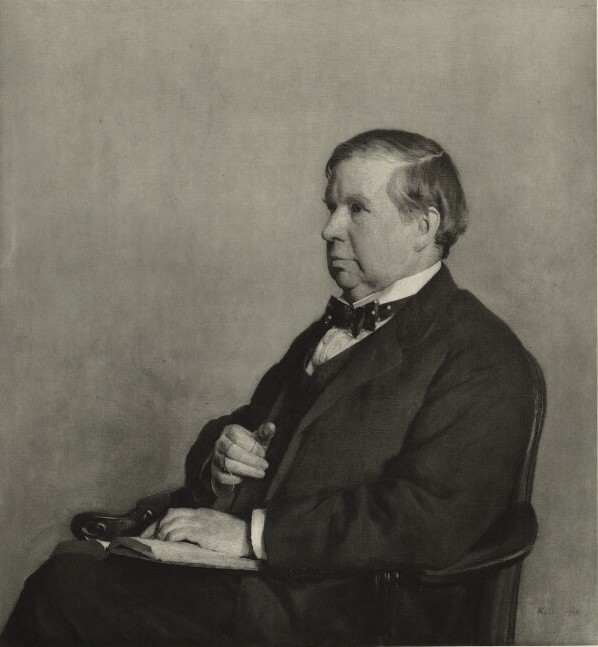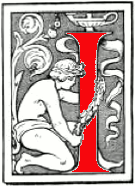
Charles Whibley, ©National Portrait Gallery, London, downloaded by kind permission, and cropped. NPG D37555.
Note: This is an excerpt from the introduction to the sixth edition of Clough's Poems (London: Macmillan, 1913), from a copy in the Internet Archive, from the Digital Library of India. Long quotations have been indented, for ease of reading. Page numbers are given in square brackets.
Charles Whibley (1859–1930) was an author and an opinionated, often cutting, literary journalist, known for his progressive views. Here, his own voice and judgement comes out briefly but with devastating effect when he says of Clough, "Clearly he was greater in his life than in his work." Incidentally, Whibley was the brother-in-law and friend of James Abbott McNeill Whistler. — Jacqueline Banerjee

t was among his contemporaries that Clough’s fame stood highest, and tried by their judgment, he comes out of the ordeal with an easy triumph. Clearly he was greater in his life than in his work. The friend of Tennyson and Carlyle, of the Arnolds, of Proude and Bagehot, of Emerson and Norton, of Lowell and Longfellow, he was known and acclaimed on either side of the Atlantic. And he was thus beloved, because he made no attempt to capture the friendship of those about him. He was never fussy, never insincere. He liked neither to give nor to accept flattery. He did not think a vast deal of his own performances, and he refused to surrender his sense of proportion in estimating the works of others. That which he left behind, a revision of Plutarch and a volume of verse, which, as he knew, inadequately expressed his talent, was not enough to win the reputation which was his. It was his guileless character which attracted his friends. He made the same impression, and for the same cause, in his youth as in his middle age. Ward, regarding him as an undergraduate, already noted his unselfishness and unworldhness. "The notion of preparing himself for success in a worldly career," wrote he,
was so far from prominent in his mind, that he might with some plausibility have been accused of not thinking about it enough. But his one idea seemed always to be that he should do to-day’s duty, and for the rest leave [xxxiv/xxxv] himself in God’s hands. And as to unselfishness, his self-abnegating consideration for others may be called, in the best sense, feminine. Then his singular sweetness of disposition: I doubt if I have anywhere seen this exceeded. I have known him under circumstances which must have given him much vexation and annoyance, but I never saw in him the faintest approach to loss of temper. Intellectually he struck me as possessing very unusual in dependence, and (if I may so express myself) straight-forwardness of thought. He was never taken in with shams, pretences, and traditions, but he saw at once below the surface.
Carlyle, twenty years later, expressed a similar view. "A mind more vivid," he wrote to Froude, "more ingenious, more veracious, mildly radiant, I have seldom met with, and in a character so honest, modest, kindly. I expected very considerable things of him."
These estimates are of the nature of panegyric. They indicate worth, gravity, kindliness. They miss an impression of individual character. Bagehot sketches Clough with a better understanding, and sets him before us, intellectually, in a recognisable shape. "Though without much fame," he says,
he had no envy. But he had a strong realism. He saw what it is considered cynical to see — the absurdities of many persons, the pomposities of many creeds, the splendid zeal with which missionaries rush on to teach what they do not know, the wonderful earnestness with which the most incomplete solutions of the universe are thrust upon us as complete and satisfying.... Mr. Clough, in his time, felt more than most men the weight of the unintelligible world; but such thoughts make an instructive man. Several survivors may think they owe much to Mr. Clough’s quiet question, "Ah, then, you think?" Many pretending creeds, and many wonderful demonstrations, passed away before the calm inquiry. He had a habit of putting your own doctrine concisely before you, so that [xxxv/xxxvi] you might see what it came to, and that you did not like it. Even now that he is gone, some may feel the recollection of his society a check on unreal theories and half-mastered thoughts.
If this too is eulogy, Bagehot’s strong sense enabled him to sketch a man, whom you would know at once were you confronted with him in argument. But of all the eulogists, it is Matthew Arnold who, in prose as in verse, has most eloquently applauded his friend. Some lines from "Thyrsis" have already been quoted. The last page of Arnold’s lectures, "On Translating Homer," is a memorable panegyric. "And how, then," said he,
can I help being reminded what a student we have just lost in Mr. Clough? He too was busy with Homer; but it is not on that account that I now speak of him. Nor do I speak of him to call attention to his qualities and powers in general, admirable as these were. I mention him because in so eminent a degree, he possessed these two invaluable literary qualities — a true sense for his object of study, and a single-hearted care for it. He had both; but he had the second even more eminently than the first. He greatly developed the first through the means of the second. In the study of art, poetry, or philosophy, he had the most undivided and disinterested love for his object in itself, the greatest aversion to mixing up with it anything accidental or personal. His interest was in literature itself; and it was this that gave so rare a stamp to his character, which kept him so free from any taint of littleness. In the Saturnalia of ignoble personal passions, of which the struggle for literary success, in old and crowded communities, ofiers so sad a spectacle, he never mingled. He had not yet traduced his friends, nor praised what he despised. Those who knew him well had the conviction that, even with time, these literary arts would never be his. His poem, of which I spoke before, has some admirably Homeric qualities; — out-of-doors freshness, life, natural, buoyant rapidity. Some of the expres[xxxvi/xxxvii]sions in that poem — Dangerous Corrievreckan . . . Where roads are unknown to Loch Nevishe — come back now to my ear with the true Homeric ring. But that in him of which I think oftenest is the Homeric simplicity of his literary life.
To have earned praise so generous as this from Matthew Arnold, it was worth while to have lived, sometimes, in an atmosphere of misunderstanding and uncertainty.
Created 5 January 2019